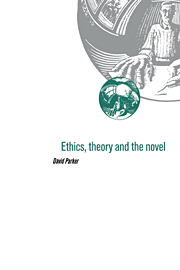Part III - TOWARDS A NEW EVALUATIVE DISCOURSE
Published online by Cambridge University Press: 05 November 2011
Summary
One thing that has emerged out of this study of the novel is that hostile, resentful or otherwise over-cathected narrative tones of voice often signal the suppression of an ethical vocabulary which is essential to the full understanding of the created fictional situation. Authors, narrators, centres of consciousness often insist on attenuated readings of the presented world precisely because they sense obscurely that some vital perspective is being occluded. The discernment of such tones is a readerly practical wisdom. It derives from the fact that the exclusion of any major ethical tradition of which we are constituted will often first impinge on us as an intuition of ‘something missing’, or as a feeling of unease in the presence of subtle narrative badgering or hectoring. As we have seen, there are now signs of a new evaluative discourse which is paying close attention to such feelings and intuitions, recognising that they are essential sources of our distinctions of worth both about literature and life. A defining characteristic of this new discourse is its capacity to make these feelings and intuitive responses articulate.
For much the same reason, the new discourse is interested in the tones of voice of theorists and critics themselves. An instructive example here is the critical prose of Kate Millett, when she discusses Connie, Mellors and the chicks scene in Lady Chatterley's Lover:
Thereupon Mellors intervenes out of pity (‘compassion flamed in his bowels for her’) and invites her into the hut for a bit of what she needs …
- Type
- Chapter
- Information
- Ethics, Theory and the Novel , pp. 189 - 198Publisher: Cambridge University PressPrint publication year: 1994



